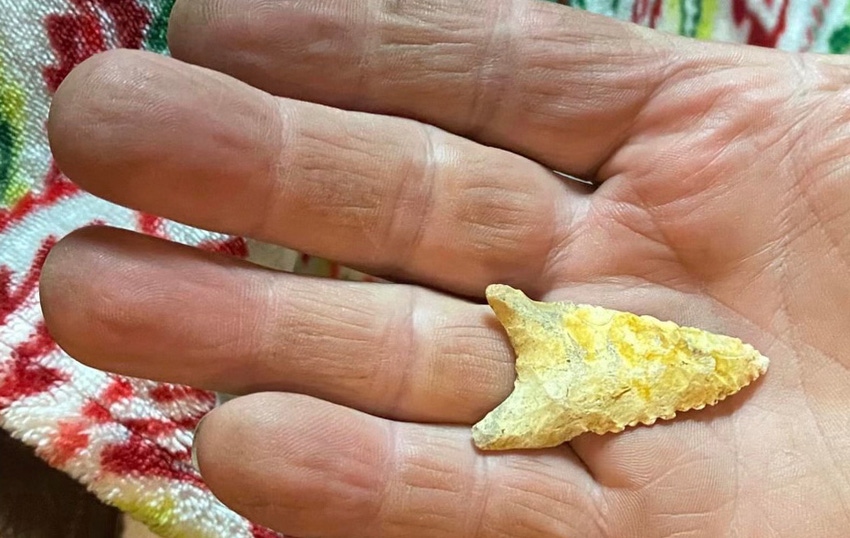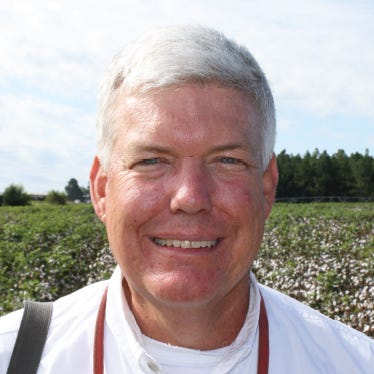
They tell me it is a good life, but life as a farmer is filled with hardship and stress that most Americans can never fully understand. We admire farmers for many reasons, not the least of which is their tenacity.
They remain stoic in handling the challenges that come their way. Many of us grew up believing that to be “tough, both physically and mentally, was a virtue. To soldier on through adversities and the desire to quit was something we looked for in our heroes. My heroes are farmers. Being “tough” is a double-edged sword for farmers. On one hand, it allows them to find success where others would quit in failure. On the other hand, a farmer may be unwilling, or unable, to seek help, especially for mental health.
The picture I posted to social media was of a farmer holding an arrowhead he had just found in his field in Georgia. I shared the picture because it was a “Dalton” point; these are especially old and are not often found. Among the comments was one that said, “The arrowhead is not the only story here; the hand of the farmer tells its own story. Only the eyes tell more about a person than do the hands. I wish I knew his stories.”
The hand in the picture is calloused, cracked, and with the hint of dirt and grease. If, as my friend believes, the hands tell much about a person, then this hand speaks of a man who is no stranger to hard work; it speaks of “tough”. Tom T. Hall sang about just such a farmer. “His face was lean and his hands were rough. His way was hogs and his nature was tough. His doctors tried to tell him that he may not live at all. But all he ever talked about was who’s going to feed them hogs.”
Across the Chattahoochee River, another man’s family has been farming in Alabama since the 1930s. As a boy of age of 7 he was being checked out of school to help with the work required at planting and harvest. Later farming on his own he grew peanuts, wheat, oats, cotton, and soybeans while also raising cattle. Together with his wife and children, he grew vegetables.
As his son reminisces, it was just an ordinary day during harvest season, but is there truly an “ordinary day” given the stresses and demands of gathering a crop? While attempting to dislodge debris lodged in equipment, the farmer’s hand was caught resulting in the loss of a significant portion of his thumb. Though bleeding profusely, the farmer was unwilling to leave his crew and family as they struggled against approaching storms. Stopping to go to the hospital was out of the question. It would take too much time.
Instead, he wrapped the wound in rags and duct tape and continued on. Later the thumb was beyond repair and it took a year for the wound to heal. The farmer’s son says that loss of fingers was not uncommon in the older generations of his family. “They were tough,” he said. “They had a job to do and they kept at it. These were the hands of farmers in my family.”
Based upon the results of a survey conducted by the American Farm Bureau in 2020, an overwhelming majority of American adults (88%) have trust in American farmers, likely due in part to their image of strength and resilience. But there is a darker side to being tough, as explored in “A Death in Dairyland Spurs a Fight Against a Silent Killer” by Elizabeth Williamson from the New York Times in April 2023.
Reported in the article, “the rate of suicide among farmers is three and a half times higher than among the general population, according to the National Rural Health Association. Suicide rates in rural communities increased by 48 percent between 2000 and 2018, compared with 34 percent in urban areas.” Ms. Williamson goes on to say, “Raised to value stoicism and self-determination, (farmers) often avoid seeking mental health treatment out of shame, and the erroneous notion that depression is not an illness but a state of mind fixable through attitude, faith or hard work.”
One farmer, Leon Statz, did seek help, but in the article, “He (the doctor) basically told Leon to ‘chin up and face it like a man — in a year, you’ll laugh at it,’” Mrs. Statz recalled. “I will never forget that. Because then Leon’s like, ‘Now it falls back on me again. It’s my fault I can’t get out of this.’” Leon Statz, like too many American farmers, ended up taking his own life.
American farmers are a tough breed. They soldier on through pain and adversity in their lives that most of us cannot imagine, and we respect them for that. We trust them for that. Knowing when to ask for help and the willingness to accept help are not signs of weakness; they are signs of strength. I encourage anyone, especially our farmers, to seek help when needed for depression and, especially, for thoughts of suicide.
Help can be found in many places, for example at this website through UGA Extension.
As farmers, your hands are calloused and your ways tough, but there are many hands reaching out to help you, both in the home and outside of the home. We need you here with us.
About the Author(s)
You May Also Like






